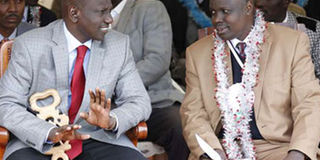Kenya’s problem is not the ICC but lack of fairness, justice and equity

Deputy President William Ruto (left) converses with Pokot South MP David Pkosing at a past press conference. Columnist Murithi Mutiga attempted to introduce reason into the ICC debate by cautioning that jailing William Ruto at the Hague is a recipe for disaster in the Rift Valley. PHOTO | CHARLES KIMANI | DPPS
What you need to know:
- The assumption that Truth and Reconciliation facilitates the healing of a nation must be weighed against the genuineness of perpetrators to construct a different and better future, a commitment that is lacking in Kenya.
- Many Kenyans, driven by genuine nationalism, argued against the ICC option more than five years ago.
- It requires dealing with the national question by examining the terms of co-existence between diverse constituencies within a nation-state.
The last two weeks has been full of what singer Lucky Dube described as political diarrhoea.
Kenyans are addicted to political food that causes political diarrhoea but are unable to realise that diarrhoea kills.
The current brouhaha that passes for public discourse on the ICC issue is plain political diarrhoea.
Columnist Murithi Mutiga attempted to introduce reason into the ICC debate by cautioning that jailing William Ruto at the Hague is a recipe for disaster in the Rift Valley.
He relied on Mahmood Mamdani and Thabo Mbeki’s argument that mass political violence is not just driven by perpetrators; “political violence has a constituency and is driven by issues, not just perpetrators”.
The two argue that precisely because ‘issues’ drive ‘constituencies,’ courts, with their focus on perpetrators, cannot end civil war.
Mamdani and Mbeki have done enormous work in Sudan and South Sudan.
But there is reason to doubt their appreciation of the nuances of the Kenyan ICC experience.
In particular, their prescription of the Codesa model is a dangerous one-size-fits-all recommendation that avoids accountability in the name of ‘issues’ and ‘constituencies.’
The assumption that Truth and Reconciliation facilitates the healing of a nation must be weighed against the genuineness of perpetrators to construct a different and better future, a commitment that is lacking in Kenya.
THREATS OF VIOLENCE
What we have in Kenya are threats of violence in the Rift Valley that are designed to hold all of us hostage to a discredited elite.
Codesa gave South Africa ‘reconciliation without justice’ and facilitated a dangerous, greedy and undemocratic elite pact that is unfolding before our eyes.
There are four dilemmas we face in Kenya.
First, unlike Sudan, we went to the ICC, the ICC did not just come to us. William Ruto actively pushed for the ICC.
Constituencies were mobilised to support the ICC option and successful efforts neutered anyone, including the then President and Prime Minister, who preferred a local mechanism.
Mr Ruto even chided Kofi Annan not to delay sending the infamous envelope to the Hague.
Our current dilemma is that one constituency is holding us at ransom with indecision and threats.
We now are forced to change course and toe their new line just because it now dawns on them that the ICC is not a joking matter.
Many Kenyans, driven by genuine nationalism, argued against the ICC option more than five years ago.
It is a sign of utter contempt to our intelligence to cite this argument now?
Second, Kenya has a diversity of constituencies, beyond the Kikuyu and Kalenjin as political constituencies.
HEALING THE NATION
It is exclusionary not to remember this. Those who do not belong to these two political constituencies should not be made captive of the idiosyncrasies of the two political constituencies.
There are many ethnic Kikuyu and Kalenjin who genuinely do not conform to these two political constituencies, preferring instead to see the logic of the wider Kenyan nationhood.
Why must we herd them into a constituency they don’t subscribe to?
Finally, blaming the courts is unhelpful in thinking through politically motivated mass violence.
The solution is constructing a post-war dispensation that ensures justice, fairness and equity.
It requires dealing with the national question by examining the terms of co-existence between diverse constituencies within a nation-state.
Uhuru Kenyatta and Ruto must acquit themselves on this, now that they hold power.
After all, what made Codesa ‘successful’ is the promise to construct a different future.
Where does Jubilee Coalition stand in concretely mediating to heal their two constituencies and the wider national constituencies?
Beyond self-serving prayer meetings and staggered pecuniary tokens to IDPs, what mechanisms of reconciliation and harmony have been created between ordinary Kikuyu and Kalenjin co-existing in the Rift Valley?
Ultimately, the problem is not the ICC, it is ensuring justice, fairness and equity as a basis of healing the nation.





